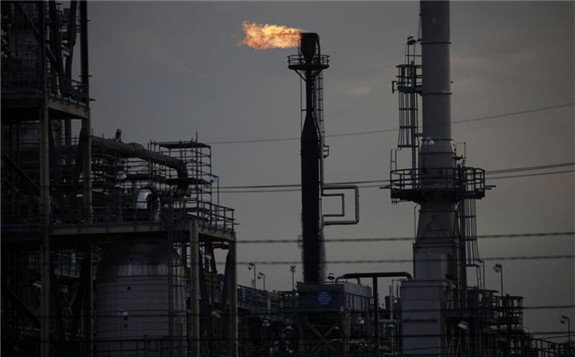The global energy crisis is threatening the global economic recovery, the International Energy Agency said on Thursday, with record natural gas prices expected to boost oil demand by half a million barrels per day,

Global shortages of natural gas are increasing demand for oil and placing yet more pressure on strained oil supplies, the IEA said in its monthly oil report. This, in turn, is helping to feed rising inflation and slow the world's recovery from the Covid-19 pandemic.
"Record coal and gas prices as well as rolling blackouts are prompting the power sector and energy-intensive industries to turn to oil to keep the lights on and operations humming," the Paris-based agency said.
"Higher energy prices are also adding to inflationary pressures that, along with power outages, could lead to lower industrial activity and a slowdown in the economic recovery."
Oil prices have surged above $80 a barrel – the highest level in three years – as traders predict higher demand for alternative fuels as gas prices continue to rise.
The IEA said a reduction in the number of new Covid-19 cases and rising mobility are helping to boost demand for oil, with global fuel demand now 2 per cent below pre-Covid levels compared with a deficit of more than 10 per cent at the start of 2021.
Global oil demand is now expected to recover to pre-pandemic levels next year, the IEA said, as it made upward revisions to its demand forecasts for this year and 2022, increasing them by 170,000 bpd and 210,000 bpd respectively.
Prices rose by about 1 per cent on Thursday after the IEA's upgrade to its demand forecast.
Brent crude futures rose 1.1 per cent to $84.05 a barrel by 10.10am London time after falling 0.3 per cent on Wednesday.
Separately, Sir Jim Ratcliffe, the founder of British manufacturing company Ineos, said on Thursday that Britain could run out of gas this winter, with the lack of gas storage in the UK leaving the country vulnerable to soaring prices with a long winter potentially causing demand to outstrip supply.
“That’s a strategic issue for energy supplies in the UK, you need some storage, and we’ve got 10 days. Ten days’ storage is a bit pathetic really for a nation as important as the UK, on the continent they’ve got 40 or 50 days’ storage," Mr Ratcliffe said.
Mr Ratcliffe said a prolonged cold spell this winter could “shut down industry” in the UK amid fears demand from business and consumers will outweigh supply.
"I think it's quite difficult to predict how long this sort of current situation's going to last, but … you'd assume it would probably run … through the winter, because obviously our gas demand increases in the winter," he said.
"Four years ago when we had, the 'Beast From The East', we were within a day or two of running out of gas in the UK. If we had run out of gas it would have been a disaster for ... older people, who wouldn't have been able to get heating in the house, [and] for industry, which would have had to shut down.”
Britain has about has about nine terawatt hours of stored gas reserves, compared with 168 in Italy and 151 in Germany, according to Gas Infrastructure Europe, meaning its capacity is equivalent to about 2 per cent of its annual demand, compared with 25 per cent to 37 per cent in Europe’s four largest storage holders.
Manufacturers, such as chemical and steel makers, have already said they may be forced to shut down plants for periods this winter if energy demand stays high.
The gas storage concerns come after benchmark gas prices hit highs of £4.07 a therm earlier this month – about 10 times higher than a year ago. However, prices later dropped after Russian President Vladimir Putin said his country, the largest supplier of gas into Europe, was prepared to help ease the crisis.
With the UK’s energy price cap preventing companies from passing on high gas costs to consumers, a dozen UK suppliers have gone bust since the start of August because of the high wholesale gas prices.
Meanwhile, the IEA's upward revisions, caused by fuel switching, “are tempered by a weaker GDP outlook” as well as higher oil prices.
Global GDP growth was lowed to 5.9 per cent in 2021 by the International Monetary Fund earlier this week, while its 2022 projection was unchanged at 4.9 per cent as supply chain disruption and the developing energy crisis dampened the economic outlook.
“Growth decelerated in Europe and in most of Asia, and appears weaker than expected in the US,” the IEA said.
“Now, coal, natural gas and electricity shortages are disrupting economic activity in China, India and elsewhere. Expensive natural gas is not only impacting power generation but also other sectors, like ammonia production, fertiliser plants, refining and manufacturing operations.”
The rising demand in the past quarter led to the biggest draw on oil products stocks in eight years, the IEA said, while storage levels in OECD countries were at their lowest since early 2015.
Global gas markets are likely to remain tighter for longer, even beyond the volatile winter ahead, analysts at Bank of America Securities said on Thursday.
“The ongoing surge in gas prices keeps making fresh headlines across the globe: Asian spot LNG prices recently hit records >$200/boe – dragging up European and US prices in their wake as strong Asian demand has further globalised formerly regional gas markets.
“We believe the trend is exacerbated by synchronised price rallies in thermal coal and EU carbon – limiting elasticity of supply while price caps limit elasticity of demand.
“We believe delays to LNG developments worldwide risk global gas markets remaining structurally tighter into 2025.”